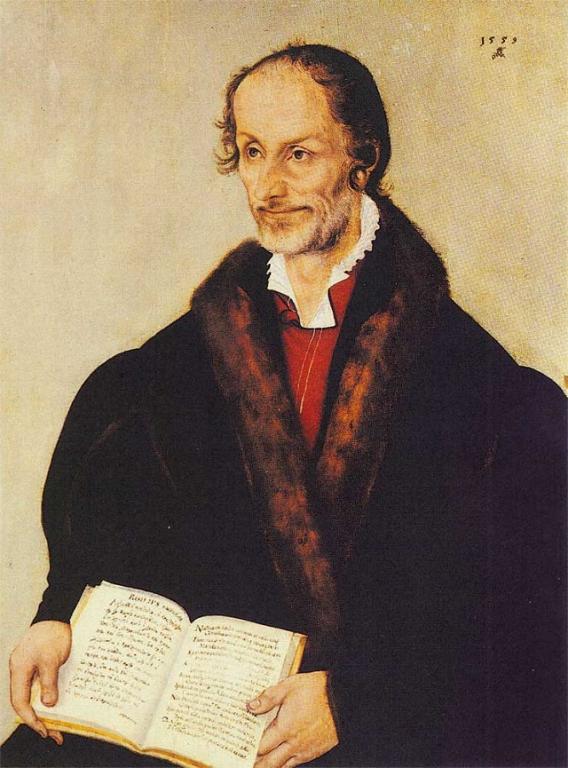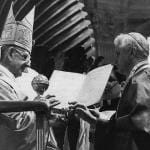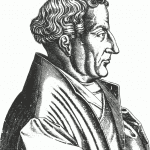
Because secularist historian Will Durant misattributed a quote to the Lutheran successor of Martin Luther, Philip Melanchthon (1497-1560) and I cited it in 1991 research, therefore, according to Calvinist anti-Catholic polemicist, James Swan, “Rome’s cyber-apologists” are guilty of “sloppy work” and this is an illustrative example of “Rome’s apologists at their best” and therefore, Catholics aren’t “deep into history.” Huh? This is really how this guy “argues,” believe it or not. It’s from a recent paper by Swan, posted on his Boors All website.
He’s been obsessed with trying to make Catholics look like witless dumbbells (and above all, to try to embarrass me: whom he has classified as a psychotic) for some dozen years now. He’s tried in vain to refute my work all these years. Give him an E for effort, if nothing else. For some time now, he has refused to even name my name (even posting several book reviews of my books without my name!), but rest assured, he has me in mind in all this, because he cites one of my 1991 papers on the “Reformation” as the source of what someone on the anti-Catholic CARM discussion board cited.
He goes into ridiculous, excruciating, “no one could care less” detail (even including long German and Latin quotations), establishing that Durant blew a quote. Great! And “duh!!!” Durant is a human being like all the rest of us, and quite capable of missing a detail. In fact (shhh! [whispering] don’t tell anyone!) I’ve documented Swan himself (back when I still bothered with him more than twice a year) doing this times without number. He is by no means perfect in his research and every jot and tittle of documentation in it. But he’s always lightning-quick to accuse anyone else of incompetence and idiocy if they happen to make the tiniest mistake of this sort. This is what intellectual midgets and wannabes do.
Never mind that the idea that Melanchthon was trying to get across is actually (without question) his own opinion, as can easily be shown. Catholic historian Johannes Janssen wrote in his History of the German People (Vol. VI, 534):
Melanchthon had been the first and the most vehement in complaining that the princes and municipal authorities who had taken the church management into their own hands had no real interest in religion or in the promotion of Christian discipline. ‘The imperial cities,’ he wrote, ‘do not trouble themselves about religion: all they care for is emancipation from the dominion of the bishops.’ ‘The princes do not concern themselves at all about these matters; one creed is as good in their eyes as another.’ Under cover of the Gospel the princes were only intent on the plunder of the churches, on gambling, drinking, and other degrading pursuits. ‘What state of things shall we bequeath to posterity if the authority of the bishops is abolished? Even were it allowable to overthrow the organization of the Church, it would be scarcely salutary. What will become of the parishes if the old customs and usages are done away with, and no more regular church overseers appointed?’
Note all the citations from Melanchthon (in green). But the italicized section [italics added currently] was not a Melanchthon quote. Durant mistakenly thought it was, and I passed on the mistake in my early research on the “Reformation”: right after I became a Catholic in 1991.
Swan couldn’t care less about what Melanchthon actually believed (which is what professional and amateur historians seek about historically important people). His only interest is in embarrassing Catholics and making them look like ignoramuses. But it was Will Durant who blew the quote, and he wasn’t even a Catholic.
So what is the point to be made? That I cited a quotation supposedly from Melanchthon that a professional historian botched; therefore, I can’t be trusted in my research? Anyone (well, anyone but the endlessly obtuse Swan) would immediately recognize that that is ludicrous. I dealt with the actual issue of what Melanchthon thought of bishops and princes who replaced them at great length over seven years ago.
But Swan wants nothing to do with that sort of serious discussion. He’d rather major on the minors and note that Will Durant blew a quote in the 1950s, and moan about my passing on the error in a 1991 overview paper. The point (whether “polemical” or not) is that Melanchthon didn’t think much of the rule of the princes, as a substitute for the rule of bishops (as under the Catholic Church). He made that quite clear.
Hence he wrote to perhaps his best friend, Joachim Camerarius, in a letter of August 31, 1530:
Oh, would that I could, not indeed fortify the domination, but restore the administration of the bishops. For I see what manner of church we shall have when the ecclesiastical body has been disorganized. I see that afterwards there will arise a much more intolerable tyranny [of the princes] than there ever was before. (C.R. 2, 334) (from: “Historical Introductions to the Symbolical books of the Evangelical Lutheran Church,” by F. Bente, section 70; published in: Triglot Concordia: The Symbolical Books of the Ev. Lutheran Church: St. Louis: Concordia Publishing House, 1921 / “C.R.” = Corpus Reformatorum, a collection of primary early Protestant sources in Latin, French, and German, edited by Karl Gottlieb Bretschneider in Halle starting in 1834)
Protestant Church historian Philip Schaff mentioned this belief of Melanchthon’s, on p. 33 of his History of the Christian Church, Vol. VII (Chapter One; § 10):
The transfer of the episcopal and papal power to the head of the state was not contemplated by the Reformers, but was the inevitable consequence of the determined opposition of the whole Roman hierarchy to the Reformation. The many and crying abuses which followed this change in the hands of selfish and rapacious princes, were deeply deplored by Melanchthon, who would have consented to the restoration of the episcopal hierarchy on condition of the freedom of gospel preaching and gospel teaching.
Also, in the same volume, Chapter Five, § 76:
The Protestant sovereigns became supreme bishops in their respective dominions. They did not preach, nor administer the sacraments, but assumed the episcopal jurisdiction in the government of the Church, and exercised also the right of reforming the Church (jus reformationis) in their dominions, whereby they established a particular confession as the state religion, and excluded others, or reduced them to the condition of mere toleration. This right they claimed by virtue of a resolution of the Diet of Speier, in 1526, which was confirmed by the Peace of Augsburg, 1555, and ultimately by the Peace of Westphalia, 1648. The Reformers regarded this secular summepiscopate as a temporary arrangement which was forced upon them by the hostility of the bishops who adhered to the Pope. They justified it by the example of Josiah and other pious kings of Israel, who destroyed idolatry and restored the pure worship of Jehovah. They accepted the protection and support of the princes at the sacrifice of the freedom and independence of the church, which became an humble servant of the state. Melanchthon regretted this condition; and in view of the rapacity of the princes, and the confusion of things, he wished the old bishops back again, and was willing even to submit to the authority of a pope if the pope would allow the freedom of the gospel. In Scandinavia and England the episcopal hierarchy was retained, or a new one substituted for the old, and gave the church more power and influence in the government. [my italicized and bolded emphases]
So let Swan play his games and spend his time on trifles and stupid stuff. I’m interested in actual history, in all its colors and complexities. That’s what readers get from me, and they also get fairness. I wrote a critical book about Martin Luther (as might be expected of a Catholic apologist), but I also recently compiled an entire book of his words that Catholics could agree with.
I’m an apologist, but I’m also an ecumenist, who rejoices in truth wherever it is found. Therefore I could edit a book like that, which can potentially create all kinds of Catholic good will towards Luther, the founder of Protestantism. But a raving anti-Catholic like Swan has no such interest in unity and finding common ground. He can”t even figure out that Catholics are fellow Christians.
And so he spends his time in ridiculous, worthless activities like this one. Note well, folks, the vast difference between his goals and mine. I simply seek historical truth. Swan seeks to belittle and deride fellow Christians, regarding whom he is so confused and bigoted that he thinks they are no Christians at all. The difference between seeking truth and seeking to lie about others is huge indeed.
Addendum: Typical Example of Swan’s Goofball Citations
One of the funniest Swan mishaps and mistakes, of the nature of which he is always excoriating others, occurred in a dispute about Luther’s sanction of the execution of Anabaptists. I documented this thoroughly in a paper of mine: Reply to Reformed Luther Apologist James Swan’s Request for Documentation of Executions of Anabaptists Sanctioned by Luther, in the 1530s [8-17-14].
After I wrote the paper, Swan made a very embarrassing mistake and cited sources he got from me, while pretending not to. Funniest of all, he thought that an Anabaptist martyr from the 16th century (Peter Pestel) was the editor of a recent Mennonite Encyclopedia. It’s absolutely classic Swan antics and foibles.
Now, this may seem like my nitpicking or piling on, in a case of a simple mistake or human error. Readers may wonder why I am making such a “big deal” about it. I do precisely because Swan is always pointing out human errors in Catholic works (he’s noted real or — usually — falsely alleged — ones in my writings for seventeen years). If a Catholic had made such an embarrassing error like this, we can be sure Swan would have trumpeted it from the rooftops as yet more evidence that we don’t know how to properly cite a source, and that we’re always trying to lie about and misrepresent Luther; that we’re, well, kind of dumb, and that we know nothing about context in reading and citing sources.
***
(originally 2-4-15 on Facebook)
Photo credit: Philip Melanchthon, 1559, by Lucas Cranach the Younger (1515-1586) [public domain / Wikimedia Commons]
***













